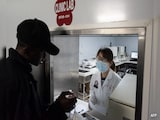Staying well hydrated is essential for overall health. It is one of the best and simplest things you can do for your overall well-being. Proper hydration supports numerous bodily functions, enhances physical performance, and helps prevent various issues, including headaches, constipation, and others. Although hydration is often associated with drinking water, other beverages and foods can also contribute to your overall fluid intake.
A recent study has highlighted that drinking a combination of healthy amounts of coffee, tea, and water might help you live longer. The study, published in the British Journal of Nutrition, found that people who drank around 7 to 8 cups per day of coffee, tea, and water combined had the lowest risk of dying from any cause. Researchers looked at data from over 1,80,000 adults in the UK for about 13 years. They examined whether the amount and type of drinks people had each day affected their risk of dying from major causes like heart disease, cancer, or breathing problems. The data revealed that having seven to eight drinks per day, when counting coffee, tea and water together, was associated with the lowest risk of death from all causes as compared to people drinking fewer than 4 drinks per day. These causes majorly included cancer, cardiovascular diseases, digestive conditions and respiratory disorders.
The study also found that the best mix of drinks was about 2 parts coffee to 3 parts tea (2:3 ratio), along with water. People who drank this mix had the lowest chances of dying from various diseases. However, the study further mentioned that this doesn't mean drinking more is always better; going over 9 drinks a day might actually increase the risk of heart problems. So, there seems to be a sweet spot around 7-8 cups daily. Additionally, for people drinking fewer than 4 drinks per day, replacing water with tea or coffee did not show a clear advantage because, at very low total fluid intake, the negative effects of dehydration or caffeine may offset benefits.
About tea and coffee consumption
Coffee and tea are among the world's most popular beverages. Both these beverages are considered healthy when consumed in moderation. Caffeine, the primary active ingredient in coffee, helps improve focus, attention and overall mental performance. While tea contains relatively low amounts of caffeine as compared to coffee, it is rich in polyphenols, particularly catechins like EGCG, a powerful compound that reduces inflammation and prevents certain chronic diseases. Coffee is also rich in antioxidants, which can help combat oxidative stress. Both tea and coffee are linked to a lower risk of Parkinson's disease, Alzheimer's disease, type 2 diabetes, and certain types of cancer.
While tea and coffee are healthy, it is important to consume them correctly for maximum benefits. Here are some tips for safe consumption:
- Consume them in moderation. Excessive caffeine consumption can lead to jitters, insomnia, anxiety or increased heart rate.
- Be mindful of additives like sugar and cream. Using them too much can do more harm than good.
- If you have a pre-existing health condition, such as high blood pressure or heart conditions, it's wise to consult your doctor to determine the appropriate amount of tea or coffee for you.
- Tea and coffee can be dehydrating, so make sure to drink plenty of water throughout the day.
To conclude, the study suggests that drinking a healthy amount of coffee, tea, and water, around 7 to 8 cups a day, might help you live longer, especially if your drinks include more tea than coffee. But don't overdo it, and remember that other factors like diet, exercise, and overall lifestyle also play a big role in your health. It is also important to note that this was an observational study, which means the findings are based on the patterns and do not prove that drinking more coffee or tea directly causes people to live longer. The amounts of sugar, milk, or other additives in people's coffee or tea were not fully known, which could affect the outcomes
Disclaimer: This content including advice provides generic information only. It is in no way a substitute for a qualified medical opinion. Always consult a specialist or your own doctor for more information. NDTV does not claim responsibility for this information.















